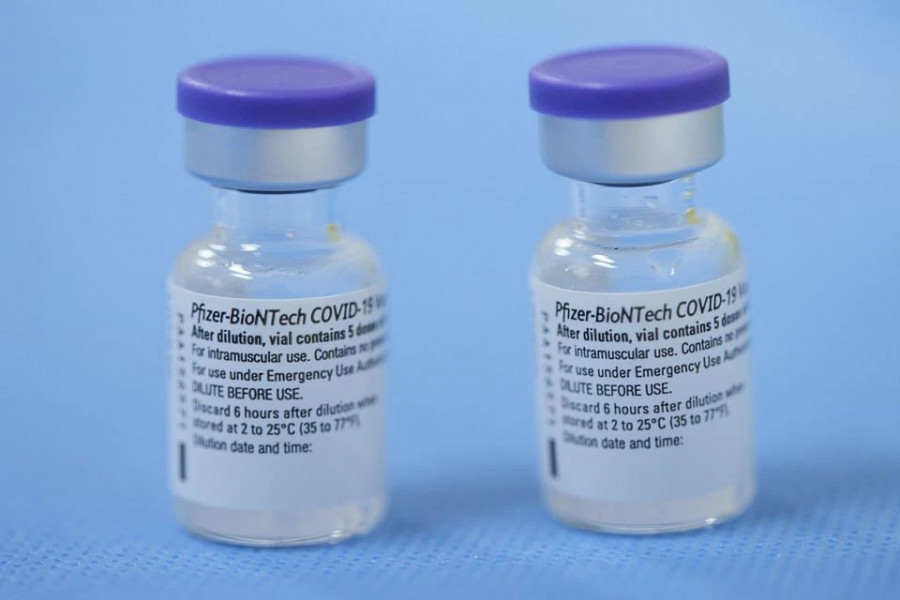Health
Prime Minister’s Office is blocking Health Ministry’s attempt to buy Pfizer vaccine
Ministry says it wants approval for purchasing 6 million doses of the vaccine through a non-disclosure agreement.
Arjun Poudel
Prime Minister Sher Bahadur Deuba has been saying that all eligible people will be vaccinated for Covid-19 by mid-April next year. But contrary to this commitment, the Prime Minister’s Office has been preventing the Health Ministry from procuring vaccines.
It has been learnt that his office has twice sent back a file of the Health Ministry seeking Cabinet approval for purchasing 6 million doses of Pfizer-BioNTech Covid-19 vaccine, which is crucial for meeting the vaccination target.
“The file we sent to the Cabinet for approval to purchase 6 million doses of Pfizer-BioNTech vaccine has been returned twice,” Dr Roshan Pokhrel, Secretary for the Health Ministry, told the Post. “So we are sending the file to the cabinet again today [Wednesday].”
The ministry had first sent the file to the Prime Minister’s Office on October 24.
Officials said that a Cabinet permission is needed as they plan to purchase the vaccine through a non-disclosure agreement with the vaccine manufacturer.
“We sought permission to purchase vaccines through a non-disclosure agreement as per the request of the vaccine manufacturing company,” an official at the Health Ministry told the Post, asking not to be named, as he is not authorised to talk to the media. “But the Office of the Prime Minister and Council of Ministers has asked us to purchase the jabs making the deal like the one we made with the Serum Institute of India while procuring Covishield, the AstraZeneca type vaccine.”
The Health Ministry had purchased 2 million doses of Covishield in February through an open deal paying $4 per dose of the vaccine.
Officials said that purchasing Pfizer-BioNTech vaccine through an open deal is not possible at present as many countries have been struggling to secure sufficient doses of the vaccine and Nepal cannot pay internationally competitive prices for the jabs.
Earlier, Nepal had earlier purchased 10 million doses of Vero Cell vaccine with Chinese vaccine manufacturing company Sinopharm through a non-disclosure agreement.
Officials said that the government should not have any problem signing another non-disclosure agreement, as the country needs vaccines to save lives and has already procured 10 million doses through such a non-disclosure agreement.
However, Nepal’s law does not allow such an agreement.
An official at the Department of Health Services told the Post that Dr RP Bichha, Prime Minister Deuba’s public health expert advisor, might have obstructed the file on Pfizer-BioNTech vaccine. Prime Minister Deuba had appointed Bichha as public health expert advisor after the new health minister removed him from director general of the Department of Health Services.
“Even a dumb person can understand the intention behind returning the file,” said an official at the Health Ministry requesting anonymity. “When they suggest procuring the vaccine through an open deal, it means they are in no hurry for a deal.”
Bichha was due to retire, but the incumbent government has extended his service for two years.
When asked why was the file returned, Bichha said he was unaware of it.
“I don’t know if the Health Ministry has sent any file to the Cabinet,” Bichha told the Post. “As I don’t know about any such file I can’t comment.”
Officials at the Health Ministry, meanwhile, said all necessary preparations have been completed for signing a procurement deal and all they need now is a Cabinet nod.
Nepal has decided to take a loan from the World Bank to purchase the vaccine produced by an American manufacturer. An official at the Health Ministry said the government will duly follow the conditions set by the World Bank for taking loan to purchase Pfizer-BioNTech Covid-19 vaccine.
Pfizer-BioNTech is an mRNA-based Covid-19 vaccine. The vaccine developed jointly by the US-based Pfizer and the German firm BioNTech uses a copy of a molecule called messenger RNA (mRNA) to produce an immune response.
It is said that the Pfizer-BioNTech vaccine was 95 percent effective at preventing laboratory-confirmed infection with the coronavirus.
According to the US Centers for Disease Control and Prevention, the Pfizer-BioNTech vaccine was also highly effective at preventing laboratory-confirmed Covid-19 infection in 12-15-year-olds, and the immune response in these adolescents was at least as strong as the immune response in 16-25-year-olds in clinical trials.
“Evidence shows mRNA Covid-19 vaccines offer similar protection in real-world conditions as they have in clinical trial settings—reducing the risk of Covid-19, including severe illness by 90 percent or more, among people who are fully vaccinated,” the US Centers for Disease Control and Prevention said on its website.
The vaccine needs to be stored in minus 70 degrees Celsius, which is not supported by Nepal’s existing vaccine storage facilities.
The COVAX facility, an UN-backed international vaccine-sharing scheme, has already provided 100,620 doses of PfiZer-BioNTech vaccine to Nepal and authorities concerned are preparing to administer the jabs to people with compromised immunity from 24 hospitals throughout the country.
Nepal has also signed a concessional loan agreement with multilateral funding agencies like the Asian Development Bank and the World Bank to support Nepal’s resilient recovery from the Covid-19 pandemic.
Nepal and the World bank signed a $150 million (Rs17.78 billion) concessional loan agreement in June.
In August, the Asian Development Bank and the Nepal government signed a $165 million (nearly Rs20 billion) loan agreement to purchase safe and effective vaccines against Covid-19.
Nepal became the second country globally when it completed agreements with GAVI to procure 4 million doses of the Moderna vaccine in August, financed by the World Bank, through the COVAX’s cost-sharing option.
Nepal so far has used AstraZeneca, Sinopharm and Johnson & Johnson vaccines to inoculate its population.
Nepal needs to vaccinate around 78 percent of its 30 million population—or around 25 million people, as per the government’s new plan that includes those aged between 12 and 18 years. Earlier, the government had planned to vaccinate only those aged 15 years and above.
Since around 4-5 million people are said to be living abroad, the government needs to vaccinate around 19-20 million people. For this, the country needs a little over 40 million doses of double-shot vaccines.
Nepal had launched its Covid-19 vaccination campaign on January 27 with 1 million doses of Covishield, the AstraZeneca type vaccine manufactured by the Serum Institute of India.
Altogether, the country has received 20,179,810 doses of Vero Cell, AstraZeneca, Janssen and Pfizer-BioNTech vaccines.
As of Wednesday, 7,381,202 people (24.3percent of the total population) have been fully vaccinated, according to the Health Ministry.




 27.41°C Kathmandu
27.41°C Kathmandu















